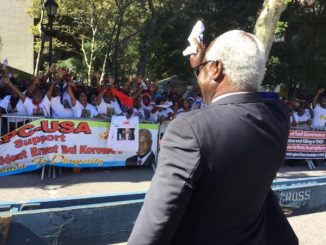
By Ranger
One of the lasting legacies that His Excellency Dr. Ernest Bai Koroma will be widely remembered for, both at home and abroad, is ensuring that the Local Content Policy holds sway in this country. Most have indeed testified that since he took over office, President Koroma has so far demonstrated the genuine intension to transform this nation, a commitment that is evident in the various development interventions that his Government has rolled out in different parts of the country. Though certain schools of thought have argued that some of those whom he surrounded himself with had been acting contrarily, the fact still remains that when he leaves office he would have etched a name for himself for the profound changes he championed that will indelibly go down the annals of history.
It is quite apparent that for too long the citizenry have been left vulnerable to the wiles of foreign investors who took undue advantage of the huge capital in their possession to have an edge over local competitors. The situation became so worse that some of these foreigners preferred hiring expatriates to perform tasks which ordinary Sierra Leoneans could better do, a condition that did not help in bridging the unemployment gap that kept soaring.
Our local merchants could not keenly compete with their foreign counterparts so also were home-based industries not able to withstand the currents of foreign owned companies and importers who produced or brought in similar products that are produced locally. Compounding the circumstance further was that even inputs used in the production of certain goods, though available here at home were rather imported to the disadvantage of the producers. In short, the economic neo-colonial machinery was at high gear at the detriment of the overall economic development of the nation.
This anomaly sharply came to the fore when multi-national companies like African Minerals, London Mining Company, ADDAX, Bollore African Logistics emerged within the economic landscape of this country. London Mining Company, for instance, at one point in time decided to hire the service of a foreign based company to transport its ore from the mining sites to the Queen Elizabeth Quay. Ironically, there were local transporters who could equally perform the same task. This imbalance bred a bitter resentment and our local transporters mounted an intense campaign to ensure that the Government steps in and address the situation. Similar situations related to the hiring of cooks, carpenters and other auxiliary workers by African Minerals and other companies occurred which many deemed as very unfair.
Local producers like the Sorghum farmers, that supply sorghum to the Sierra Leone Brewery Company Limited (SLBL), could not expand their production base to supply more and that had a rippling effect in terms of earning more from their efforts to offset bank loans and take care of other overhead costs. The simple reason was that importers of foreign beverages were given certain tax leverages which placed them at a vantage position to realize more benefits from the drinks they brought in but SLBL could not because they cannot effectively compete with regards price variance.
Based on mountain campaigns by rights activists and those who were directly affected, it was against the aforementioned backdrop that President Koroma, in his wisdom, decided that it is high time that this country should have a Local Content Policy(LCP) in place so that local businesses would not continue to be vulnerable. The necessary protocols were followed and the LCP came into being. It now became legal that as long as the country has individuals with the requisite skills to perform certain tasks any foreign investor should employ their services. Moreover, it was enshrined that certain legislations must be put in place to protect local businesses from external shocks.
It was therefore a matter of expediency that subsequent provisions of Finance Acts must take into consideration the Local Content Policy. Along that line, the 2016 Finance Act was seen as a big blessing for local businesses as its provisions really provided a covering net for our indigenes. One of the beneficiaries was the Sorghum Farmers in this country. It ensured that they supplied SLBL more and the number of the farmers grew by leaps and bounds, more taxes accrued to Government. Equally too, SLBL was and is now able to withstand external economic competitions thereby be in a position to offer more jobs, pay more taxes, do more for the community it operates by way of Corporate Social Responsibility and expand its production base. Today, SLBL has in its possession gadgets that it recently imported which include seven fermentation tanks to boost production and is now in a position to supply the entire country with beverage drinks.
Without mincing the truth, the Local Content Policy must be sustainable if we are to deepen our economic gains. This must be in tandem with favorable provisions of Finance Acts. We cannot divorce the Local Content Policy from overall National Development!



